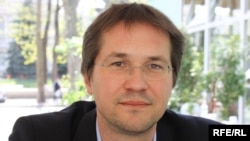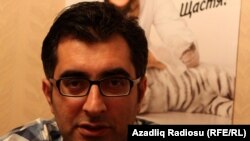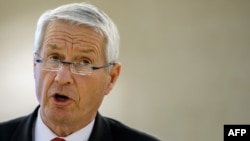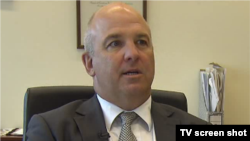Gerald Knaus is the founder of European Stability Initiative (ESI), a Berlin-based think tank working on South-eastern Europe, Turkey and the Caucasus. They have published a series of reports on Azerbaijan starting with “Generation Facebook in Baku. Adnan, Emin and the Future of Dissent in Azerbaijan” in 2010. Most recently Gerald Knaus spoke in Oslo at the Sakharov Freedom Award Seminar calling on the European organization and most notably Council of Europe to step up in standing for its core values. Mr. Knaus talked to RFE/RL Azerbaijani Service about the recent developments around the CoE and Azerbaijan.
Q: Last week Elkhan Suleymanov, a leading member of the Azerbaijani delegation to the Parliamentary Assembly of the Council of Europe (PACE), published an article about ESI. He defended the Council of Europe in general and the secretary general of the institution against your criticism. What do you make of this?
GK: Elkhan Suleymanov is obviously unhappy that we draw attention to an extraordinary situation. In recent months Azerbaijan's human right dissidents have received the most prestigious human rights prizes across Europe. And yet not only are they in jail, but most of them were arrested or sentenced whilst their country was holding the chairmanship of the Council of Europe. This is unprecedented in its history.
Take the case of Anar Mammadli for example. In 2012 he was an advisor to the rapporteur of PACE on the issue of political prisoners. In 2013 he exposed irregularities during the October 2013 Presidential elections in Azerbaijan. He was arrested a few weeks later and sentenced to more than five years in prison in May 2014, just as Azerbaijan assumed the chairmanship of the Council of Europe. In September 2014 an independent commission acting on behalf of PACE awarded him the Vaclav Havel Prize. He is now among those very political prisoners he once advised on.
For the government in Baku, however, Anar Mammadli remains an ordinary criminal. He is still in jail. It is noteworthy that until today neither the Committee of Ministers of the Council of Europe (which represents its 47 member states) nor the secretary general of the Council of Europe, former Norwegian prime-minister Torbjorn Jagland, have called for his unconditional release. Instead, in a recent article in the Guardian, Mr. Jagland described Azerbaijan as a "young democracy" in need of help. We criticized this, in writing, in presentations, and most recently in Oslo. And now Elkhan Suleymanov has come to Mr. Jagland’s defense. This is a very strange alliance, but it is not surprising in light of what has happened in the Council of Europe in recent years.
A proud human rights institution has been captured and silenced by an autocratic regime. This will not change until democrats across Europe begin a campaign to take their institution back, and to shame those responsible for the situation at present.
Suleymanov says he defends the European Court of Human Rights (ECtHR) while ESI attacks it. Is the ECtHR not the best remaining protection for human rights in Azerbaijan?
The ECtHR is a noble and important institution, but it is a court for democracies. There is a good reason why in the past dictatorships – Franco’s Spain, the Soviet Union, Greece under military rule – were not members. The Court could not have coped. It relies on some good faith by authorities.
Instead today the regime in Baku has fallen in love with the Court. It lends a fake aura of legalism to its political justice. It allows Baku to say that in the end there is always a legal remedy somewhere. Mr. Sulyemanov is very clear in his article: “the issue of political prisoners is a legal issue and should be resolved in the legal context. Therefore, as mentioned, I completely share the view expressed in the article of the European Stability Initiative referring to Mr. Jagland that the final word should be given to the European Court of Human Rights on the issue of political prisoners."
Take the case of Ilgar Mammadov, who used to work with the Council of Europe. The European Court found that "the actual purpose of his detention had been to silence or punish Mammadov for criticising the government and publishing information it was trying to hide.” Baku has been ordered to pay him 20,000 Euros. Mammadov has been in jail since early 2013. And he remains in jail today. But even if he is released, can one say the system has worked, given there are many dozens of others like him, arrested in recent months? That the regime is playing a cynical game?
Obviously, a court with less than 50 judges for 800 million people can only accept a fraction of important cases. This is no deterrence. Yet Azerbaijan argues that since everyone arrested in Baku has the theoretical right to go to the court in Strasburg, until there is a final verdict nobody should demand their release. It uses the court as a fig leave.
Mr. Jagland says that he is trying his best to get prisoners released. Is this not true?
What is tragic is that the secretary general of the Council of Europe, instead of exposing this abuse of the system, agrees with Azerbaijan on the proper role of the Court. Here is a quote from a meeting Mr. Jagland had with president Aliyev in the summer 2014:
“Secretary General said the definition of a ‘political prisoner' should not be left exclusively to PACE, but that the final word should be given to the European Court of Human Rights. He said that of course the judgment with respect to Ilgar Mammadov is not yet final, but asked the President that his country does not send the case to the Grand Chamber and that it be brought to an end. The President supported SG's view that only the Court should decide on the definition and the "status" of political prisoners …”
This explains why Mr. Suleymanov today defending Mr. Jagland.
Mr. Jagland instead should demand the immediate release of Anar Mammadli, Leyla Yunus and others. He should order an investigation into credible claims that there is a long list of political prisoners in Azerbaijan today. He needs to put all this on the agenda in the Committee of Ministers. He could do these things immediately. But so far, he is acting in a way that makes Mr. Suleymanov and President Aliyev happy. I cannot believe that this is a position he wants to be in.
You criticized international reactions to the recent amnesty of political prisoners?
Yes. These reactions were farcical. Take the story of Shahin Novruzlu, who was released this month. He was arrested at age of 17 in March 2013 as a member of the youth group Nida on alleged drug charges. He was tortured during his detention, losing four of his front teeth, according to Amnesty International. He was then sentenced to six years. His father, who always believed in his innocence, died while he was in jail. In order to secure his release he was pressured to write a letter to the President Aliyev: "I want to note that until now I have never been a member of any political organization and will not continue as a member of any political organization" read his letter.
It is great that he was released. And yet, was pardoning him an act of mercy, after 19 months behind bars, for crimes him and his colleagues never committed? In the meantime more people were arrested. And yet, Mr. Jagland wrote in the Guardian "…there are glimmers of hope. Three weeks ago, Azerbaijan's President Ilham Aliyev pardoned some 80 prisoners, among them four human rights defenders."
This is political theatre of the absurd. Unfortunately the Council of Europe is playing along, according to a script written in Baku.
Not everyone at CoE silent. What about its Human Rights Commissioner who has been very outspoken recently. Is this not a contradiction?
Unfortunately not. Recently Niels Muiznieks wrote a very moving personal reflection about his impressions visiting the prisoners: “Azerbaijan will go down in history as the country that carried out an unprecedented crackdown on human rights defenders during its chairmanship. All of my partners in Azerbaijan are in jail.”
He has consistently been outspoken. And yet one honest man is not enough to save the institution as long as the Secretary General, the Parliamentary Assembly, the Committee of Ministers are all failing in defending its core values. While Nils Muznieks describes the deteriorating situation, Mr. Jagland writes in his Guardian piece, "current legislation [in Azerbaijan] stifles" the activities of civil society. Yet, the legislation changed during Azerbaijan’s chairmanship, does not just “stifle”. The new legislation is meant to totally suppress all independent activities in the country. During this summer, the bank accounts of dozens of independent NGOs were frozen. Criminal procedures have been launched against the most respected local and international NGOs, from the Legal Education Society to the Institute for Reporter's Freedom and Safety, from IREX to the National Democratic Institute. The staff of these organizations is in hiding, in exile or in jail. There is a need for much clearer language coming from Strasburg.
You often meet with EU reps and have been involved in organizing many events about political prisoners in Azerbaijan. What is the attitude of the people in Brussels about Azerbaijan?
Recently the president of the European Parliament, Martin Schulz, made a clear statement calling on the Azerbaijani government “to release this innocent woman, Leyla Yunus.” We have not heard this from the Council of Europe yet.
However, when it comes to the EU’s executive, the situation is not much better, unfortunately. There is a sense in Brussels that it would be unwise to point out the obvious: that Azerbaijan is a dictatorship in which human rights are abused systematically; that things are as bad as in Belarus, if not worse. The EU has introduced targeted sanctions against human rights offenders in Belarus. It needs to consider the same for Azerbaijan.







